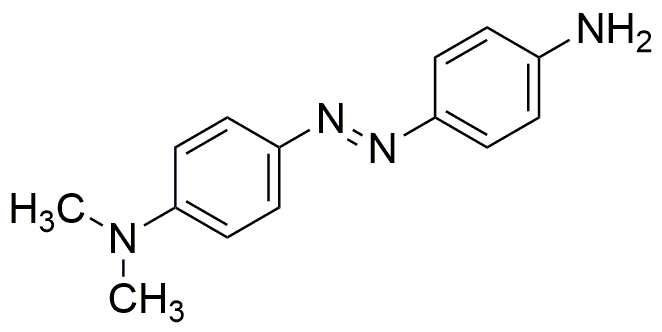N,N-Dimethyl-4,4'-azodianiline is widely utilized in research focused on:
- Dyes and Pigments: This compound is commonly used in the production of azo dyes, which are known for their vibrant colors and stability. These dyes are extensively applied in textiles, inks, and plastics, providing a wide range of color options for manufacturers.
- Polymer Chemistry: It serves as a colorant in various polymer formulations, enhancing the aesthetic appeal of products such as plastics and rubber. Its ability to withstand heat and light makes it a preferred choice in the industry.
- Analytical Chemistry: Researchers use this compound in analytical methods, such as spectrophotometry, to develop colorimetric assays. These assays help in detecting and quantifying substances in various samples, aiding in quality control and research.
- Biological Research: N,N-Dimethyl-4,4'-azodianiline is employed in studies involving azo compounds, contributing to the understanding of their biological effects and potential applications in drug development.
- Environmental Monitoring: This chemical can be utilized in the development of sensors for detecting pollutants in water and soil, providing a practical solution for environmental scientists aiming to monitor and mitigate contamination.
General Information
Properties
Safety and Regulations
Applications
N,N-Dimethyl-4,4'-azodianiline is widely utilized in research focused on:
- Dyes and Pigments: This compound is commonly used in the production of azo dyes, which are known for their vibrant colors and stability. These dyes are extensively applied in textiles, inks, and plastics, providing a wide range of color options for manufacturers.
- Polymer Chemistry: It serves as a colorant in various polymer formulations, enhancing the aesthetic appeal of products such as plastics and rubber. Its ability to withstand heat and light makes it a preferred choice in the industry.
- Analytical Chemistry: Researchers use this compound in analytical methods, such as spectrophotometry, to develop colorimetric assays. These assays help in detecting and quantifying substances in various samples, aiding in quality control and research.
- Biological Research: N,N-Dimethyl-4,4'-azodianiline is employed in studies involving azo compounds, contributing to the understanding of their biological effects and potential applications in drug development.
- Environmental Monitoring: This chemical can be utilized in the development of sensors for detecting pollutants in water and soil, providing a practical solution for environmental scientists aiming to monitor and mitigate contamination.
Documents
Safety Data Sheets (SDS)
The SDS provides comprehensive safety information on handling, storage, and disposal of the product.
Product Specification (PS)
The PS provides a comprehensive breakdown of the product’s properties, including chemical composition, physical state, purity, and storage requirements. It also details acceptable quality ranges and the product's intended applications.
Certificates of Analysis (COA)
Search for Certificates of Analysis (COA) by entering the products Lot Number. Lot and Batch Numbers can be found on a product’s label following the words ‘Lot’ or ‘Batch’.
*Catalog Number
*Lot Number
Certificates Of Origin (COO)
This COO confirms the country where the product was manufactured, and also details the materials and components used in it and whether it is derived from natural, synthetic, or other specific sources. This certificate may be required for customs, trade, and regulatory compliance.
*Catalog Number
*Lot Number
Safety Data Sheets (SDS)
The SDS provides comprehensive safety information on handling, storage, and disposal of the product.
DownloadProduct Specification (PS)
The PS provides a comprehensive breakdown of the product’s properties, including chemical composition, physical state, purity, and storage requirements. It also details acceptable quality ranges and the product's intended applications.
DownloadCertificates of Analysis (COA)
Search for Certificates of Analysis (COA) by entering the products Lot Number. Lot and Batch Numbers can be found on a product’s label following the words ‘Lot’ or ‘Batch’.
*Catalog Number
*Lot Number
Certificates Of Origin (COO)
This COO confirms the country where the product was manufactured, and also details the materials and components used in it and whether it is derived from natural, synthetic, or other specific sources. This certificate may be required for customs, trade, and regulatory compliance.


